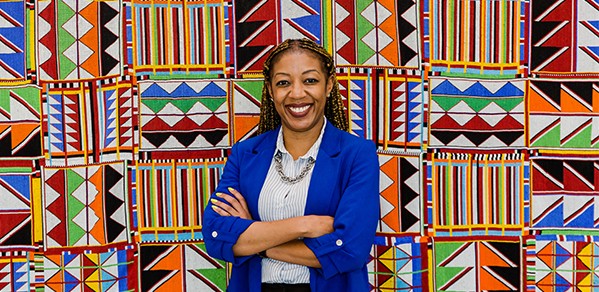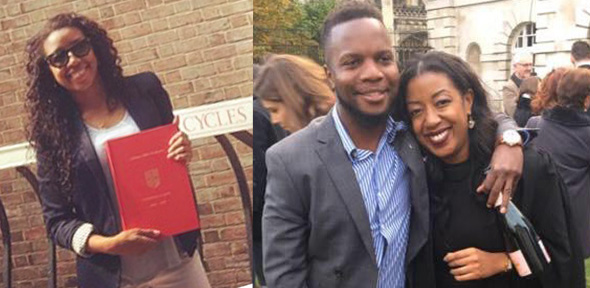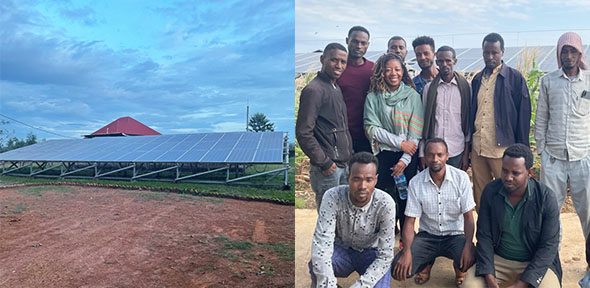
When alumna Tombo Banda embarked on the MPhil in Engineering for Sustainable Development programme at Cambridge, she had one goal in mind: to pursue engineering work that culminated in meaningful, sustainable and long-standing change for her home country of Malawi, and across the African continent.
Cambridge was 11 months of pure fun for me. I was surrounded by interesting and driven people, in a bubble of academic excellence, learning new things (rowing!) and having fun, all while gaining a life-changing MPhil degree.
Alumna Tombo Banda
Fast-forward seven years and Tombo’s aspiration to achieve greater impact has been realised. She now leads the Mini-Grid Innovation Lab at CrossBoundary in Nairobi. The Innovation Lab is a dedicated research and development fund established to test business model prototypes on mini-grids, working with both mini-grid developers and utilities to develop the ‘grid of the future’ – one that is more interconnected, reliable, flexible, efficient and economical.
A mini-grid typically involves stand-alone small-scale electricity generation isolated from the main grid. They tend to be used for electrifying rural communities and, with more than 600 million people in Sub-Saharan Africa still without access to electricity, it is conservatively estimated that at least 265 million of these people are most cost-effectively served by mini-grids.
With 15 years’ professional experience in engineering roles already behind her, including a position at McKinsey & Company’s Africa Delivery Hub, Tombo’s future aspirations are to continue to influence and shape the infrastructure landscape across the African continent. Here she reveals more about her Cambridge experience and career journey to date.
My engineering journey began back in 2004, when my dad convinced me that my natural strengths in Design and Technology, Mathematics and Physics were suited to a career in Mechanical Engineering. Driven by a desire to combine creativity and science to help improve people’s lives, I decided to study Mechanical Engineering at Imperial College London. Unbeknown to me, this was also part of my dad’s succession planning; he ran an engineering consultancy. After completing my studies, I went back to Malawi to work with him.
I spent seven years in our company, Prime Engineering, working on key infrastructure projects locally and in West Africa. One particular highlight was working on an 8 tonne per hour mango processing factory in Salima, a town in central Malawi, providing more than 100 local jobs and generating much needed foreign exchange for the country. A pioneering value addition project, this work culminated in me achieving my chartership with the Institution of Mechanical Engineers (IMechE).
My work had highlighted the potential of engineering projects to bring about development and improve people’s lives. However, I was aware that this development could come at an environmental price, with long-standing economic implications in the long-term. This was what led me to pursue the MPhil in Engineering for Sustainable Development (ESD) as part of the 2015/16 cohort – the desire to ensure that my engineering work did, in fact, bring about meaningful, sustainable and long-standing change for my country and the region.

Tombo with a copy of her Cambridge MPhil dissertation. Tombo is also pictured with her cousin, celebrating at her Cambridge graduation day.
After graduating from the MPhil in ESD course, I joined McKinsey & Company’s Africa Delivery Hub, where I served African governments and the public sector in the delivery of development projects. The work centred broadly around public investment management – ranging from multi-billion dollar infrastructure projects, to energy access projects, to supporting public holding companies.
My learning curve was steep, the stakes were a lot higher than some of the projects I had previously worked on in Malawi. However, my hands-on engineering experience, coupled with my learnings from the MPhil in ESD, seemed to put me in very good stead. Foremost in my mind was Cambridge Emeritus Professor Peter Guthrie’s Sustainability Assessment of Large Infrastructure Projects module, which centred around balancing economic, environmental and social dimensions in large-scale infrastructure project design, evaluation and decision-making. Though I certainly applied the theory, the role play we did at the end of term (which was of disgruntled community members suing an infrastructure company) was most relevant – dealing with emotional stakeholders can be more challenging than any complex project analysis!
I came to realise that energy was the real catalyst for development and that everything depended on it – health, sanitation, education and industry. The transformative impact of energy was what led me to my current position leading the Innovation Lab at CrossBoundary. Today, the Innovation Lab is working on the ‘grid of the future’ – a decentralised network balancing millions of nodes of generation, storage and consumption across utilities, public-private partnerships, and consumers. The Innovation Lab is supporting the sector to accelerate this transition by trialling new business ideas that drive commercial viability.
For mini-grids to attract the private capital needed to scale energy access across Africa, business models need to achieve at least 12% Internal Rate of Return (IRR) at about 46 cents per kilowatt hour (c/kWh) tariff. The Innovation Lab is currently testing 11 innovations with 27 developers and one public utility, in nine countries, across 118 sites. The cost-saving and demand-generating innovations tested so far have shown that they can increase mini-grid IRR by 5.5%. To reach the 12% target, we need to increase IRR by another 6.5% through innovations that reduce capital expenditure by approximately $2,300/kW and increase average consumption per user to about 95kWh/month. We need to uncover, test and scale the innovations to meet this target quickly, if there is any hope of achieving the Sustainable Development Goal 7 (SDG7) – universal electrification by 2030.

LEFT: A mini-grid, in Rwanda, where the testing of one of the Innovation Lab’s prototypes is carried out. RIGHT: Tombo is pictured with workers and community members in front of a mini-grid situated in Mino, in the east of Ethiopia.
More recently and in parallel with this work, I am also working on an e-mobility financing platform to support the acceleration of the African electric vehicle sector to scale. Electric vehicles have the potential to disrupt the transport sector across the continent at a more rapid pace than other geographies. For one, the required infrastructure to enable this does not have to be converted – in many cases it has not even been built yet!
I remember the Sankey diagrams at Cambridge we created, detailing how transport emissions would need to be reduced by increasing the transition to electric – I am hoping to play a part in making this a reality on the African continent! I wish to continue my work in the energy space and put a serious dent in the energy access gap as it stands today. More broadly, the infrastructure investment gap on the continent is huge, and I intend to play my part in driving investment into e-mobility, industry, roads, bridges etc. – with responsibility and sustainability at the core.
Cambridge was 11 months of pure fun for me. I was stimulated in all senses; I was surrounded by interesting and driven people, in a bubble of academic excellence, learning new things (rowing!) and having fun, all while gaining a life-changing MPhil degree. I have the fondest memories of my time there. I am thankful for receiving the Beit Cambridge Scholarship to attend, and grateful to all who made it such an enriching experience!
I am excited for everyone pursuing the MPhil in ESD course at this time – it could not be more important to be in this space. When I started the course, we were fresh out of COP21, and despite the Paris Agreement's goal to limit global warming to well below 2 degrees Celsius, now, seven years later, we are tragically off course. It is up to current and future cohorts of this course to redirect public opinion and policy, and put in place the radical changes we need to avert irreversible climate change. What I love about engineering is that it allows us to do just that. We can put theory to action, through the understanding, designing, implementing and facilitating of technology solutions that enable us to achieve these lofty goals.

